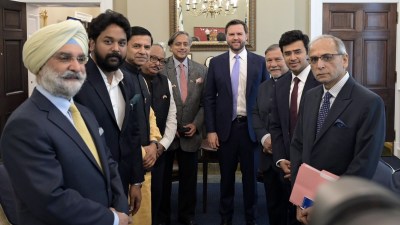A Vindication of the Rights of Woman
This past week, the Twitterati stood in solidarity with women’s contributions to global and national politics
 This past week, the Twitterati stood in solidarity with women’s contributions to global and national politics.
This past week, the Twitterati stood in solidarity with women’s contributions to global and national politics.
The social web has been abuzz with indignant people responding to two sexist statements made by people in power, against the perceived role of women in our societies. Tim Hunt, the celebrated Nobel prize winner, in a speech he gave in Seoul, suggested that female scientists in the lab are a distraction because they either fall in love or they break into tears when their work is criticised. The other statement is closer home, when Prime Minister Narendra Modi, in a back-handed compliment to the Bangladeshi Prime Minister Sheikh Hasina, appreciated her strong stance against terrorism “despite being a woman”. Both of these ‘casual’ comments sparked a range of responses on the Internet.
Read more: #DistractinglySexy: Why women scientists are panning Nobel winner Tim Hunt
Twitter, the level playground, quickly spawned interesting hashtags. #DistractinglySexy invited female scientists around the world to pose in their scientific gear, smiling and reclaiming their space in the world of science and research. The pictures were both irreverent and dignified, showing that not only are female scientists present and strong, undistracted and focussed on their work, but they are also funny and engaged. It might have done Dr Hunt, who is now complaining about being bullied by the social web, after his summary dismissal from various positions of power over his “silly” statement, good to remember that he is being punished not for silliness but for reinforcing the ways in which women’s contributions to science and technology have been historically made invisible.
It might have stood him in good stead, if he had seen the pictures of the women scientists at the Indian Space Research Organisation, celebrating the landing of the Mangalayan landing on Mars, to remember that his statement reduces their accomplishments and those of all the women present in workforces as he characterises them as weak and prone to emotional outbursts. Ironically, he is unable to see his complaints about how he has been treated by international media and his home institutions alike, as both weak and irrational, complaining when he is at the receiving end of the stick.
Modi’s statements have also faced sharp critique for their sexist imagination of women and their role in international politics. With the hashtag #DespiteBeingAWoman, the Twitterati came to arms to stand in solidarity with women’s contributions to global and national politics. They have pointed out that the reigning government’s reverent celebration of women as mothers, daughters, and sisters continues to perpetuate the idea that the woman’s place is not in public. Any woman who cares to bring herself into the public is seen as exceptional, as doing a man’s job, or is critiqued for not being like one of the boys. Modi should have known better than to suggest that a woman prime minister has had to overcome her gendered identity in order to make a political commitment against a global problem. And Twitter users were quick and ready, not only to point out the strong sexism of this remark, but also to unearth strong female role models who have shaped the destinies of nations and fates of societies.
In both these instances, cyberspace has shown again why we constantly need to fight for free speech and inclusive expression on the internet. As conservative forces seek to regulate the internet and penalise users for opposing views or dissenting stance, it is good to remember what is at stake when our voices online get regulated. It is reassuring to see that the social web continues to empower people to critique and hold accountable, those in power, for their mistakes; that powerful men with their huge influence in shaping public opinions and policies, are forced to rectify their positions. It shows how the presence of the digital public has clear implications on physical realities, and the need to fight for free and open digital commons where these voices shall be heard without the fear of impunity or punishment.
Nishant Shah is a professor of new media and the co-founder of The Centre for Internet & Society







